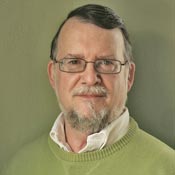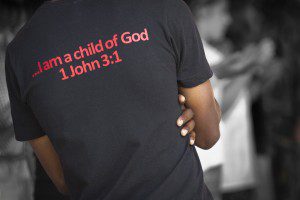 We coin the phrase “paradigm shift” to describe a complete change of frame of reference, a complete restructuring of reality as we know it, a replacement of what we’ve always known with something unforeseen or utterly unknown. Often this can be subliminal, working change quietly, yet deeply, in the worlds both around and inside us. For example, the advent of the computer and the Internet has made things quite different for those who can remember life without them. We can say the same for the advents of other older technological advances such as radio and television.
We coin the phrase “paradigm shift” to describe a complete change of frame of reference, a complete restructuring of reality as we know it, a replacement of what we’ve always known with something unforeseen or utterly unknown. Often this can be subliminal, working change quietly, yet deeply, in the worlds both around and inside us. For example, the advent of the computer and the Internet has made things quite different for those who can remember life without them. We can say the same for the advents of other older technological advances such as radio and television.
But “paradigm shift” simply is too benign and tame to use to describe change in spiritual things. A certain violence, profound shock and real pain come woven right into the fabric of breath and pulse for anyone delving seriously into any stripe of spirituality. Much of current spirituality is piddling around, being little more than self-centeredness bordering on toxic narcissism with a dab of Jesus jelly, Buddhist butter or reincarnation relish. We, in our selfishness with little or no outside reference to anything, proclaim as spiritual that which never disturbs the deep sediment of our lives. We like gods we can handle and who approve of us. So we sculpt them into fantasies that have the Jesus wrapper but are nothing more than our own reflection in the metaphysical mirror. The simplest reading of the Bible shows a score of lives who were pushed to the snapping point in body, mind and spirit simply by encountering the living God.
One of those lives in modern day belongs to Benjamin Corey, author of Undiluted: Rediscovering the Radical Message of Jesus. I must confess a certain prejudice coming into this book and it is this. Some Emergents are wearing me out. I could switch covers on many of their books and not be able to tell them apart. Everything before them hasn’t been armpit scrapings and manure (which many of their children, by the way, will say about their churchmanship). Some of these old people who love to sing out of a hymnal have demonstrated biblical faithfulness longer than some Emergents have been alive. Some sound elitist; grow some humility in critiquing those who walked before you. Some have run into the same gunk that has driven church leaders crazy for almost two thousand years, thrown up their hands and retreated into conference speaking. I also must confess that Benjamin Corey melted my prejudices because he is his own lab rat. (Nothing personal, Ben.) He makes his case from his own story.
Corey grew through the early stages of his faith in a very conservative New England evangelical church. To sum up, they have the Christian faith nailed down to one point; everyone right with God looks, acts, believes, smells and burps like us. Don’t get snarky here; this weed grows in every corner of the Christian faith. And Corey lived in this until, after a stint in the military, he began work at Gordon-Conwell Theological Seminary, a fine interdenominational school. Now the stress fractures not only begin but spread with the speed of the seismic activity of an Icelandic volcano. The faculty comes from every corner of the faith. New theologies and ideas, some that Corey up till then believed heretical, get inside his head on a daily basis like a swarm of hornets. Thinking is both hard work and dangerous, possibly explaining why we do so little of it. We might find out our old ideas and theologies simply are too small for God, must be torn down and we’re the ones who must do it. This hurts. As I encountered almost the exact same bouquet of struggle during the Jesus Movement, although under different circumstances, I resonated with his story here. Were it not for that time, I probably would not be in the Christian faith today. I also remember Frances Schaeffer’s account of pacing his attic attempting to dismantle every truth of the Christian faith in preparation for the challenges that lay ahead in Switzerland and L’Abri. Sometimes the things that threaten to destroy what we believe become the drive wheels launching us into the rest of our lives.
Corey also makes new friends that surprise him because they represent other corners of the faith, uncompromisingly hold beliefs that clash with both his traditional and emerging theology – and they smell like Jesus. Harold Carter, a Baptist pastor from Baltimore once said, “I’m a Baptist. I’m a Spirit-filled Baptist, a sanctified Baptist and I’ll be Baptist till I die. But I’m not a foolish Baptist. Because I know God got some people what ain’t Baptist.” God also got some people what ain’t Catholic, Pentecostal/Charismatic, Methodist, etc.
All this makes for some serious pain that conversion can be. Corey spares none of his own struggle or his wife’s patience with it. Her memoir of this time would make an interesting read. His story fleshes out describing his new eyes into the culture, the first taste of and continued search for real community, an inclusiveness (not of sin but of people) genuinely open to all, the tension of wrestling with the thorns of doubt that bristle in theological thinking. Benjamin spends some of his best space on describing the Kingdom of God and what it means to seek it first, to lay down our lives for it.
The story here really gets personal as Corey and his wife decide that, as an expression of Kingdom living, they should adopt a child. They wind up flying to Peru to pick up two girls almost too old for adoption who will sink into a future in orphanages if this falls through. It doesn’t go well and the four return to a life in the States that isn’t a success story cut out of the brochures and websites. And yet Corey and his wife embrace this life with these children that many would shun along with the brokenness that would become their new friend for Jesus and His Kingdom.
And that story sells Mr. Corey’s book. I hope it sells a lot of them. Mark Twain said that war talk by men who have been in war is always more interesting than moon talk by poets who have never been to the moon. Benjamin Corey is not howling at the moon in Undiluted. That’s why his challenge transcends their story while growing out of it. Our losing ourselves will look different from theirs. Expect it to have a mix of struggle, hurt, confusion, embracing change and sacrifice. And expect to look over our shoulder on the backside and know from that view that it was worth it.
Read an excerpt – and more – from Ben Corey’s new book Undiluted here.
 David Swartz pastors Bethel Baptist Church in Roseville, Michigan. He thinks that jazz is sacred music, that books are better company than most people, and that university towns rock. He blogs at geezeronthequad.com.
David Swartz pastors Bethel Baptist Church in Roseville, Michigan. He thinks that jazz is sacred music, that books are better company than most people, and that university towns rock. He blogs at geezeronthequad.com.











